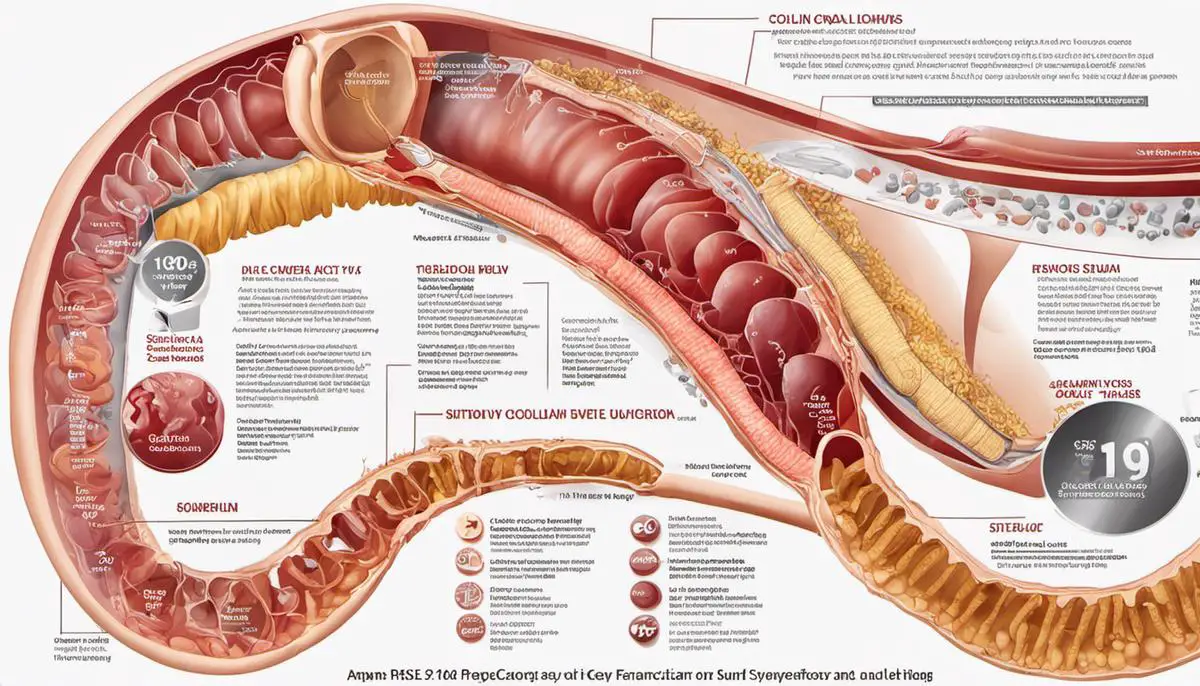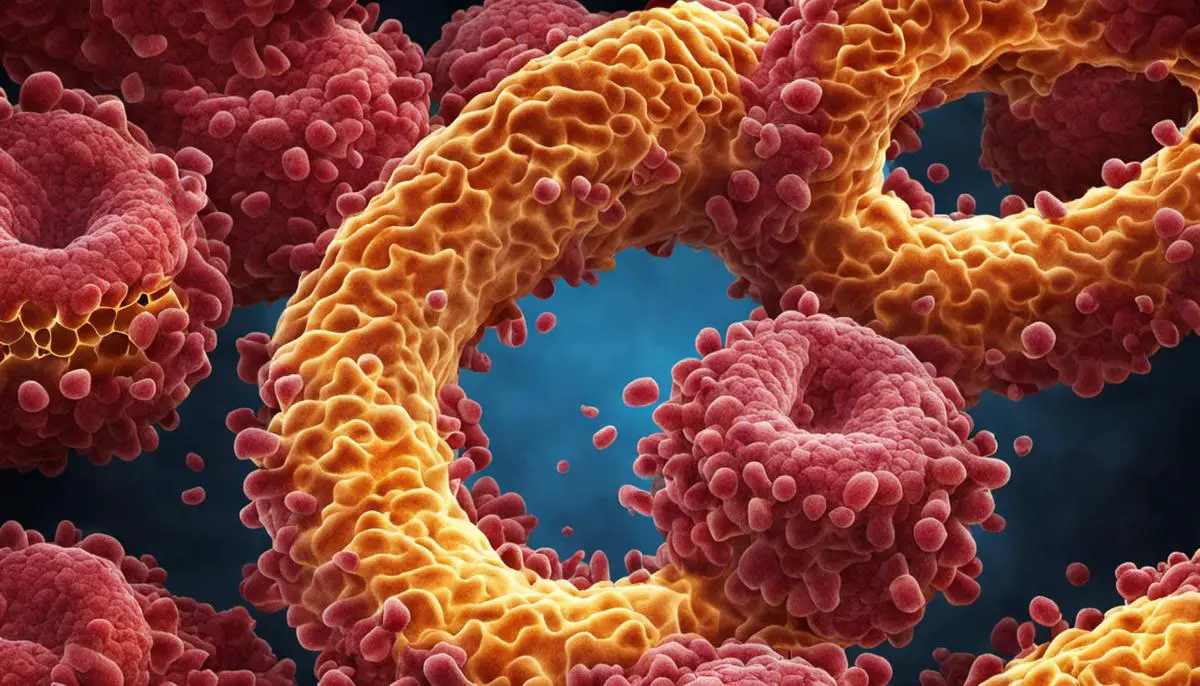Colon cancer is a devastating illness that impacts countless lives globally. With an intricate relationship to vital bodily functions, it’s not surprising that it can lead to a series of symptoms, including unexpected weight loss. This exploration of colon cancer provides a comprehensive understanding of the disease, while also shedding light on unexplained weight loss as a prominent symptom. It further dissects the diagnostic procedures and treatment options that patients may undergo, and how these can influence weight. There is also a deep dive into living with colon cancer, offering invaluable insights on weight management strategies and nutritional advice to assist patients in maintaining their overall health.
Understanding Colon Cancer
Understanding Colon Cancer: Functionality and Risk Factors
Colon cancer, also referred to as colorectal cancer, is a type of cancer that initiates in the cells of the colon or rectum—the final parts of the digestive tract. As for prevalence, it represents the third most commonly diagnosed type of cancer among both men and women in the United States, according to the American Cancer Society.
The colon has substantial roles in the digestive system, which include absorbing water and electrolytes from indigestible food matter, accepting and storing food remains that aren’t absorbed in the small intestine, and eliminating waste from the body. Colon cancer disrupts these normal functionalities by causing polyps or small clumps of cells to form on the inner lining of the colon, some or many of which may progress into cancer over time.
Risk factors for colon cancer range from age and lifestyle choices to genetics and health conditions. It’s more common among people aged 50 and older, but a growing number of younger people are being diagnosed. Diet high in red or processed meats, physical inactivity, obesity, smoking, and heavy alcohol use all increase the risk. People with a personal or family history of colorectal cancer or polyps or those with inflammatory bowel disease (IBD) are also at added risk.
Different Types and Stages of Colon Cancer
There are different types of colon cancer, such as adenocarcinomas which account for about 95% of colon cancers. Others less common types include primary colorectal lymphomas, gastrointestinal stromal tumors (GISTs), carcinoid tumors, leiomyosarcomas, and melanomas.
Colon cancer is categorized into four primary stages. Stage I is the early stage where the cancer has only grown into the inner layer of the colon or rectum. Stage II implies that cancer has grown into or through the wall of the colon or rectum but hasn’t spread to nearby lymph nodes. In Stage III, cancer has invaded nearby lymph nodes, yet hasn’t affected other parts of the body. Stage IV, the most advanced stage, means that cancer has spread from the colon to distant organs and tissues.
Understanding Unexplained Weight Loss and its Connection to Colon Cancer
When a person experiences unexplained weight loss, it might be a sign of colon cancer. This unexpected reduction in weight, which often arises without changes in diet or exercise, can indicate a serious underlying condition and should be medically assessed. Colon cancer may disrupt the colon’s ability to absorb nutrients from food, thereby causing weight loss. Additionally, our bodies can react to the presence of cancer cells by eliciting a response known as cachexia, characterized by reduced appetite and unintended weight drop.
Besides sudden weight loss, other symptoms linked to colon cancer are fatigue, unexplained anemia, consistent abdominal discomfort, a shift in bowel habits such as diarrhea or constipation, and finding blood in stool or experiencing rectal bleeding. Recognizing these symptoms early can lead to a better prognosis and provide a broader selection of treatment opportunities. It’s crucial to seek medical advice if such symptoms persist. Additionally, regular colon screenings, starting from age 45 or even earlier for those at high risk, play a pivotal role in early detection.

Unexplained Weight Loss as a Symptom
How Unexplained Weight Loss Manifests in Colon Cancer
The presence of unexplained weight loss is frequently seen in patients diagnosed with colon cancer. Unexplained weight loss specifically refers to a reduction of 5% or more of one’s total body weight in a span of six months without any known cause including changes in eating habits or level of physical activity. This surprising and non-voluntary weight loss can often be an initial discernable symptom of colon cancer, alerting individuals to the need for medical review.
Frequency of Unexplained Weight Loss in Colon Cancer Patients
Unexplained weight loss is a common symptom experienced by colon cancer patients. In fact, it is estimated that around 40% of all cancer patients experience unexplained weight loss at the time of diagnosis. This figure increases to 80% in advanced stages of cancer. Despite the frequency of this symptom, unexplained weight loss alone does not confirm a diagnosis of colon cancer as it can also be associated with other health conditions.
Implications of Unexplained Weight Loss
Unexplained weight loss has significant implications for the overall health and prognosis of colon cancer patients. Weight loss can weaken the immune system, increase vulnerability to infections, and reduce muscle strength and stamina which can overall lower the quality of life. As cancer progresses, continued weight loss can lead to a state of cachexia, a severe wasting syndrome characterized by weight loss, muscle atrophy, fatigue, and loss of appetite.
Colon Cancer’s Process Leading to Weight Loss
The mechanism through which colon cancer leads to weight loss involves several processes. A malignant tumor in the colon can interfere with the absorption of nutrients from the food that passes through the colon, leading to overall nutritional deficiencies. The body then resorts to burning stored fat or muscle tissue for energy, leading to weight loss.
Secondly, many cancerous tumors produce certain substances that speed up metabolism, causing the body to burn calories faster than normal. This, coupled with decreased appetite or dietary changes due to digestive problems, further contributes to weight loss.
Associated Symptoms of Colon Cancer
In addition to unexplained weight loss, other common symptoms associated with colon cancer include a change in bowel habits like diarrhea or constipation, blood in the stool, abdominal pain, bloating, and fatigue. It is important to note that these symptoms can also be seen with many conditions other than colon cancer. Therefore, a thorough evaluation and confirmatory diagnostic tests are essential to establish a diagnosis.
Whenever there’s a mysterious, ongoing weight loss not related to deliberate efforts, alongside other symptoms, it’s crucial to seek advice from a healthcare provider. Unexplained weight loss might be linked to several severe diseases, including colon cancer. Identifying and diagnosing colon cancer early boosts the possibility of the treatment being effective and increases survival rates significantly.

Diagnosing and Treating Colon Cancer
Understanding the Connection between Unexplained Weight Loss and Colon Cancer
Unexplained weight loss can be an indicator of various serious medical conditions, colon cancer being one of them. If you’re losing more than 5% of your body weight over six months to a year without proactively trying to do so, it’s classified as unintentional weight loss. It can result from a decrease in appetite or alterations in your body’s nutrient absorption. Although this symptom may not be immediately noticeable, over time, it can have a significant impact on your health.
Knowing the role of the colon in our bodies helps us understand how colon cancer can lead to weight loss. The colon, also known as the large intestine, is the final stop in the digestive system with its primary role being the reabsorption of fluids and the processing of the body’s waste products. When colon cancer stages its appearance, it interrupts these essential processes, impacting your body’s ability to process and absorb the nutrients from the food you eat, which, consequently, can cause weight loss.
Diagnosis of Colon Cancer
In diagnosing colon cancer, there is a series of processes and tests that medical professionals employ. Firstly, a comprehensive physical examination and medical history is taken by the doctor. This includes a detailed description of all symptoms you may have experienced, as well as your family history and lifestyle habits. This information can reveal signs pointing towards colon cancer.
Blood tests are usually conducted to examine your complete blood count and liver function. A carcinoembryonic antigen (CEA) test may also be adopted to track a protein in the blood that may increase with cancer presence.
Imaging tests like computed tomography (CT) scans and magnetic resonance imaging (MRI) offer doctors clear views of your organs and tissues, including your colon. These tests help in locating tumors, if any, and establish whether your cancer has spread.
The gold standard for diagnosing colon cancer, however, is colonoscopy. This endoscopic examination allows for direct visualization of the inner lining of your colon and rectum. If suspicious areas are noticed, a biopsy is performed where sample tissue is collected and sent to the lab for pathological evaluation.
Treatment Options for Colon Cancer
There are numerous treatment paths available for colon cancer, and the best one largely depends on the stage of the cancer and the patient’s overall health. Surgery is the most common treatment for early-stage colon cancer. The entire tumor and some surrounding tissue are typically removed in a process known as a colectomy.
For advanced stages of the disease, a combination of chemotherapy, radiation therapy, and surgery may be utilized. Chemotherapy utilizes drugs to kill cancer cells while radiation therapy uses high-energy radiation to shrink tumors and kill cancer cells. These treatments not only target the cancer cells but may also affect healthy cells, which can lead to side effects including weight loss.
Targeted therapies and immunotherapy are newer treatments and are often used when colon cancer is advanced or has returned. These therapies work by altering specific proteins in cancer cells or enhancing the body’s immune system to better combat the disease.
The Effects of Colon Cancer and Its Treatments on Body Weight and Nutritional Health
One’s body weight and overall nutrition can be significantly impacted by treatments for colon cancer. Surgery involving the removal of a portion of the colon can disrupt the digestive system’s ability to perform optimally, potentially decreasing nutrient intake and triggering weight loss.
Known side effects of chemotherapy and radiation treatments are symptoms that may lead to weight loss, such as nausea, loss of taste and smell, vomiting, and a decreased appetite.
Ensuring a proper nutritional plan while undergoing treatment is key. This can help maintain a patient’s weight, replenish nutrients lost due to the impact of the disease and treatment, and preserve their overall health. Incorporating a balanced, nutrient-rich diet and regular physical exercise can help retain muscle mass, bolster the recovery process, and enhance the patient’s quality of life. It is often beneficial to schedule routine consultations with a dietitian or nutritionist to create and manage a personalized meal plan.
Early detection of colon cancer is vital. Therefore, any potential symptoms such as unexplained weight loss should never be overlooked. Maintaining attention to one’s health and promptly addressing any concerns with a healthcare professional is crucial.

Living with Colon Cancer: Nutrition and Weight Management
Exploring Unexplained Weight Loss: An Essential Symptom of Colon Cancer
Often, colon cancer presents itself through the symptom of unexplained weight loss. Individuals with this disease may suddenly lose weight without trying due to changes in their appetite or the body’s ability to properly absorb nutrients. In addition, as the body works hard to battle the cancer, it may use more energy, potentially resulting in further reduction of body weight.
Nutritional Impact of Colon Cancer
Nutrition plays an integral role in the treatment and management of colon cancer. A high-calorie and high-protein diet may be recommended to assist the body in healing and fighting the disease. However, depending on the severity and progression of the colon cancer, patients may experience difficulty eating or maintaining appetite, bowel irregularities, or malabsorption, where the body struggles to absorb necessary nutrients.
Dietary Guidelines to Manage Weight and Support Recovery
For those living with colon cancer, it is crucial to follow dietary guidelines which help maintain weight and provide the nutrients needed for recovery. High-protein, high-calorie foods should be incorporated into the diet. Adequate hydration is necessary, although fluids should ideally be consumed between meals rather than with them to prevent a feeling of fullness that may discourage proper food intake.
Techniques for Managing Weight Loss Symptoms
There are techniques to manage weight loss symptoms while living with colon cancer. Consuming smaller, more frequent meals rather than three large ones can aid in maintaining a healthy weight. Engaging in light physical activities can help stimulate appetite and maintain muscle mass.
Role of Dietitians and Cancer Support Services
Dietitians and cancer support services can provide invaluable support by helping to monitor weight, identify excessive weight loss, and provide personalized nutrition plans. These professionals can offer dietary advice tailored to the individual’s specific needs and help manage weight loss symptoms.
Importance of Regular Monitoring and Maintenance of Body Weight
It is essential for individuals with colon cancer to regularly monitor their weight. Excessive weight loss can lead to malnutrition, further compromising the body’s ability to combat the disease. Maintaining a healthy body weight during and after treatment can aid in recovery and improve overall quality of life. Ensuring regular, nutrient-rich meals and adjusting dietary intake as per advice from a healthcare provider or dietitian can help in effective weight management.
Post-Treatment Weight Management
Post-treatment, it is crucial to continue monitoring weight and maintaining a balanced, nutrient-rich diet. Some individuals may experience a residual impact on their metabolic rate, requiring further adjustments to dietary intake. Regular follow-up appointments with a healthcare provider or dietitian can help manage any lingering side effects and guide individuals to sustain a healthy body weight after colon cancer treatment.

Dealing with colon cancer inherently implies dealing with myriad health changes, which include a possible significant drop in weight. Thus, having a broad understanding of this disease and its connection to weight loss not only helps patients and their families anticipate and face challenges, but might also aid in earlier detection and timely treatment. Emphasis has been laid on the importance of crucial aspects such as proper nutrition, weight management, and consistent medical supervision for holding a proactive stance against these challenges. Our bodies are complex, and illnesses like colon cancer remind us how interconnected all our systems are. By grasping the impact of colon cancer on weight and the importance of maintaining a balanced weight throughout recovery, we can move towards better outcomes and improved quality of life.
